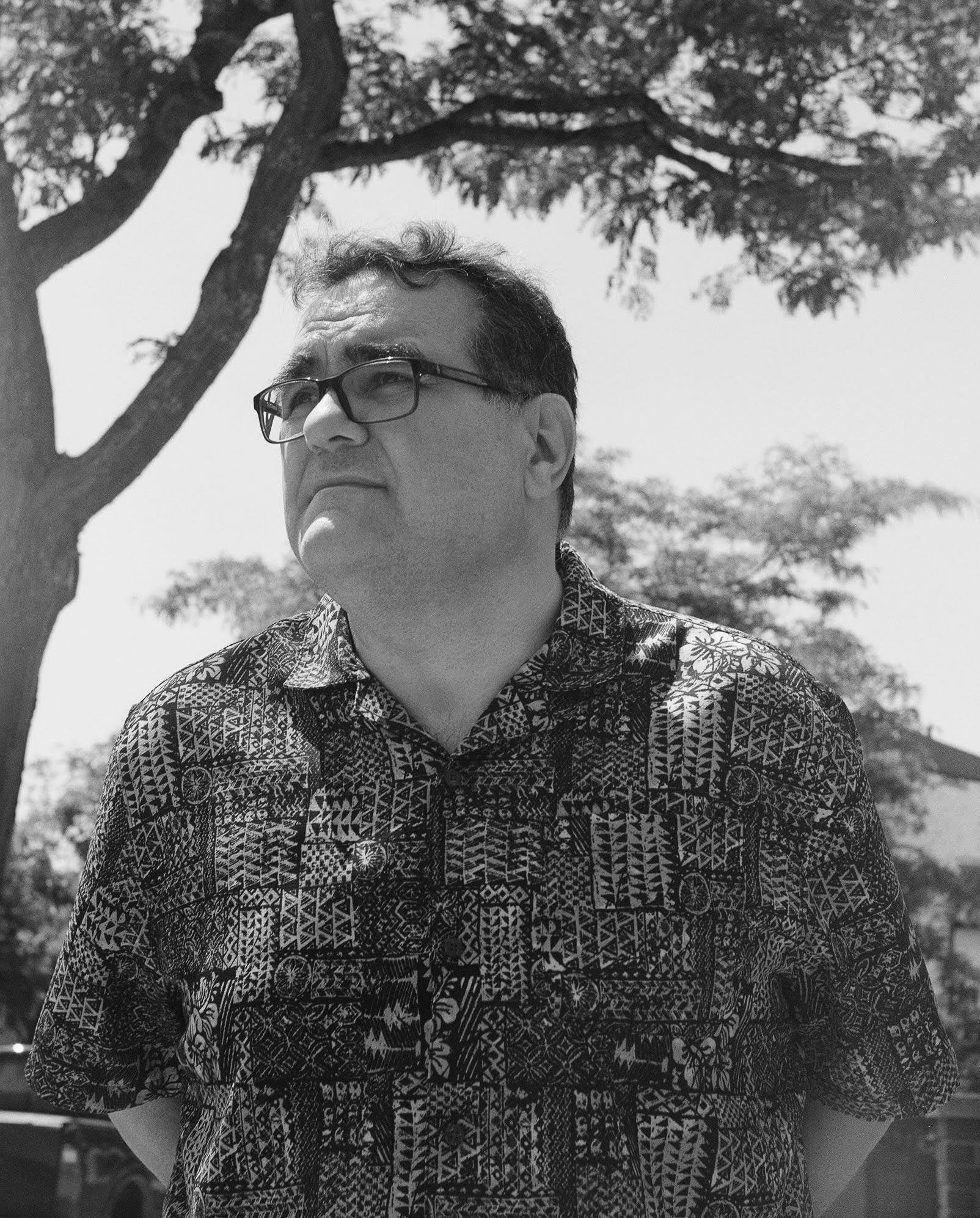An Interview With Music Journalist and Biographer Aaron Badgley
Canadian music journalist, radio host, and Beatles mega-fan and historian Aaron Badgley recently published his first book, Dark Horse Records: The Story of George Harrison’s Post-Beatles Record Label via Sonicbond Publishing. The book was so enjoyable and informative that I read it through in just two days.
Interested in learning more about his background and journey in music broadcasting and journalism, I decided to reach out to Badgley. As I discovered, Badgley is no newcomer to the music industry – he has been writing reviews and interviewing bands since he was fourteen, and producing radio shows since he was nineteen, though, like Jack Benny, he stopped aging at thirty-nine (a wonderful reference for any old-time radio buffs).
Anyone who has frequented such websites as AllMusic, The Spill Magazine, and Immersive Audio Album, or read through The Fulcrum or Lexicon Magazine has inadvertently (or maybe deliberately) read one of the thousand album reviews or band interviews he has conducted over the years. He has also hosted and co-hosted over a dozen radio shows, some syndicated across North America. In this interview, I attempt to shed some light on the forty-six years of experience Badgley has amassed in his career.
Alexander Julien: Where were you born and where did you grow up? What did your parents do? Were they, in any way, active in the entertainment industry? Were they artists (in the broadest sense of the term)?
Aaron Badgley: I was born in Oshawa and grew up in its next-door neighbour, Whitby. My dad worked at GM, then became a Captain at The Fire Department. My mom did bookkeeping. Although my dad played the banjo, he never did so professionally. My mom loved music and old movies
How did you discover The Beatles? What’s your earliest memory?
The Beatles were just a band that we had records of, among many. My earliest memory is of me being about three or four listening to my mom’s single of “I Want To Hold Your Hand” and I was mesmerized by it. Even more so by the flipside, “I Saw Her Standing There”, with that great count in..”one, two, three, four..” My older brother, Ian, had a girlfriend, Lorraine, who loved The Beatles and she would give me records and I became obsessed with them.
At what point did it become an obsession?
When I was four, I got the Help! soundtrack for Christmas. That was it…I wanted to hear them all the time, and this has just gotten worse over 56 years.
You are often asked to pick your favorite Beatle and you answer that it would be like asking a parent to choose a favorite child. Let me put this question to you differently: what is your favorite post-Beatles/solo album?
John Lennon — Mind Games; Paul McCartney — Tug Of War; Ringo Starr — Rotogravure; George Harrison — 33 and 1/3.
You told me that you wrote for several Beatles fan magazines, including Strawberry Fields Forever (published in Boston, Massachusetts), Beatlefan (published in Decatur, Georgia), and Good Day Sunshine Magazine (published in New Haven, Connecticut). Which one came first and how did you get connected with them? Did you dedicate your contributions to one fan magazine at a time or did you pitch material to all three at the same time? What kind of content did you write for them?
Strawberry Fields Forever was the first and I wrote an article after Lennon was assassinated. I had subscriptions to all three and I knew at a very young age that there were things happening in Canada about the Beatles that were unique to Canada, so I wrote them letters and suggested articles, which they accepted. I would pitch articles about Canadian-only releases and odd things released here, like Ringo Starr’s single of “Wrack My Brain” which has a very unique mix, released only in Canada on a seven-inch single. Things like that. I would type them up, and mail them off.
But before these Beatles fan magazines, while you were still in high school, attending Anderson Collegiate Vocational Institute in Whitby, you wrote for the school’s newspaper. How did you get into that and what types of articles do you recall writing? What years did you attend and write for this paper?
I was there from 1978 to 1982 and started writing in grade nine. I asked to join and I wrote movie and record reviews for our high school paper. I guess I have always had a typewriter at my fingers. I do remember reviewing The Goodbye Girl, an animated film called Wizards, directed by Ralph Bashki, The Knack’s first album, Get the Knack, Sniff ‘n’ the Tears’ debut, Fickle Heart, and the City Boy album The Day The Earth Caught Fire.
Which magazines did you read in your teenage years? Did any music journalists/critics impress you at that age, and maybe influence how you approached writing your early reviews? Or did that influence maybe come later, once you started looking at other journalists’ work seriously and appreciate what they did? Would you say you modeled your writing style after someone?
I read NME, Rolling Stone, Creem, Crawdaddy, and my favourite Trouser Press, but I don’t recall all the writers. Charles Shaar Murray is one, Cleveland Amory, and Jan Wenner.
What years did you attend Centennial College in Scarborough and what did you study? What interested you in picking that career path?
I was at Centennial from 1982 to 1985. I went there with the plan of being the great Canadian film director. But then I got interested in sound and moved towards radio. I have a face perfect for radio, lol. I love movies but that was not something I did very well, but radio and music, that I could do.
Did you work on any student films while at Centennial College?
A lot, but heaven knows where they are now. My first film, however, was documenting Anderson C.V.I’s winter festival. The film exists somewhere.
Did you begin working in radio while still attending Centennial College or after you graduated? How did you get your foot in the door?
I really wanted a show on Centennial’s campus radio, CKCC. There was a whole procedure at that time to get a show, I had to do a 20-minute tape of the show to audition. So I got a weekly show that ran for two years, Mondays from 11 to noon. It was an eclectic show of classic and alternative rock. I made tapes of sound effects. Loads of Python and Neil Innes. There was also a lot of laughter. I had fun with that show.
In the second semester of my freshman year, I did a four-month internship at CKAR, and then they wanted to hire me in the summer, so I was hired full-time while I finished my college diploma. It was hard, long, and late nights but wouldn’t change a single thing.
You spent four and a half years working for several radio stations in the Durham Region, including CKAR-FM and CKQT-FM, both in Oshawa, and then CHOO-FM in Ajax. Can you put a date range on each of these stations and detail what your job was like?
I was at CKAR for two and a half years, starting in early 1983, as a writer and record librarian. Their library was a mess, so I set it up for them so they could play oldies, etc. I then set up a system to play oldies, recurring hits, and current top 40, and I wrote commercials.
I moved to production and then production manager within a year. My first radio show was a show for the then-new Spoons album Talkback, which they were still promoting. I knew someone at Ready Records who set the whole thing up. I interviewed them and cut it together with music, then had a DJ narrate and cut in clips of the band talking. I still remember it ran on a Sunday night, and I was very proud.
I worked full-time at CKAR doing production and did tech for on-air shifts, and freelance at CKQT. They were housed in the same building so I could do both, but my full-time gig was with CKAR. I left CKAR in September 1985 and worked at CHOO until late August 1987, when I went back to school in Ottawa.
What were some of the programs you produced at the time?
At CKAR I produced Durham Top 40 (which I actually voiced), The Inside Track (a daily show that ran Monday to Friday about an artist, or album), Durham Trivia (a weekly history/current events type show where we interviewed local politicians, store owners, historians, things like that), and a call-in talk show called The Rod Hunter Show. At CKQT I produced The Scottish Review (a two-hour Scottish Folk music show), Continental Breakfast (a three-hour European Folk and pop show), and Canadian Sunrise (Monday to Friday morning, it featured Canadian artists plus every day a different Canadian history story).
I would pick the music, record it, keep it within a set time, work in the commercials, record the announcer, edit it all together, and get it prepared for air. These were the days when you had to play the whole song to get it on tape so I had the records, had to dub onto tape and edit and produce the shows, mix them, and get them on another tape for broadcast.
At CHOO I produced Canada Country (a country music show), wrote and produced commercials, and was a production manager and copywriter. Most of their programming came from the States. A lot of subscribed shows. I did some music programming and was in charge of getting all the syndicated shows on the air, which in the days of no computers was no easy task.
During this time (1984-1987), you also worked as a club disc jockey and did some live sound engineering for concerts. How did that come about? Did you start out doing college parties, which led to you getting booked in clubs and venues, or was it because you had made a name for yourself in radio?
I had a small, very small name for myself and people asked me. This was just for a short time when I was working in radio. I DJed a lot at a club in The Holiday Inn in Bowmanville. I did Thursday nights and every other Wednesday for about a year. I did a Sunday night gig at a place in Oshawa, which I cannot remember the name of. I did The Jubilee Pavilion in Oshawa, Wheelies roller rink in Whitby, The Red Dog Tavern in Peterborough, the Trent University bar and frat house in Peterborough, and others but I can’t remember their names.
I was DJing at a club and I was asked to do the sound for the band. I only did sound a few times. I often DJed when there was no band. I was briefly a soundman for my brother Kerry’s band when he would play at The Red Dog. He also attended Trent University and he would always put a good word in for me. I did sound for Reverend Ken and His Lost Followers and other bands too.
But you ended up leaving your full-time radio job to enroll at the University of Ottawa. What made you want to start a new career? Why did you choose to attend that university and what did you study?
While I worked in radio, I was involved in United Way in many capacities, but especially in toy drives during Christmas. Radio was a bit of a rut at the time, and I thought social work would be a bit more meaningful. So I went to Ottawa U and then my MSW at U of T.
While at the University of Ottawa, you joined the student newspaper, The Fulcrum. How did you get involved with this publication and do you remember your first article? Were you assigned a column or did you focus on music journalism for a section of the paper? Were you still involved in radio?
Even though I was in school, music was a big part of my life and still is. I was still Beatle mad, but I loved a lot of bands in the 1980s, one being The Smiths. I was really upset when they split after being together for such a short time. So, I wrote an article for The Fulcrum, which they accepted. It got a great response. They later approached me about writing reviews. My first review was of Jane Siberry’s concert in Ottawa. I love her music as well. Then I just kept writing in between work, school, and essays. I wrote from 1987 until 1989 and just did reviews. I did have a column and I really enjoyed the exercise of writing.
I had a radio show through Ottawa U as well, on CFUO, every Saturday from midnight until six in the morning… it was called The Meltdown Pot. That show ran from 1987 to 1989.
After your time at the University of Ottawa, you enrolled at the University of Toronto. What did you study there and what years did you attend? Did you remain involved in the radio or publishing industry at this time?
I was at U of T from 1989 until I graduated in 1991. I did apply to U of T and Ryerson’s campus radio stations but could not get on, still can’t. I tried but I was not even considered. I was always turned down. They were really difficult. While I was at Centennial and Ottawa U, I had weekly shows. But those two years at U of T were the only two years I didn’t write for music or have a radio show of any kind.
How did you get back into it in the 1990s and what were you involved with before you started writing for Lexicon Magazine and All-Music Guide?
I simply had more time on my hands. I don’t recall ever having just one job, and I didn’t after I graduated. I like writing, it really is as simple as that. From 1991 to 1997 I wrote the CUPE newsletter for work, and I tried writing a novel, epic fail, and it was my first attempt at getting a Beatles radio show off the ground. So I really focused on social work during that time and my wife, Andrea, as we were getting married.
This would be an opportune moment to cover your wife and daughters’ artistic undertakings.
I guess you could say we are an artistic family, except me. My wife is a painter and does stained glass, and she is very talented. My eldest daughter, Emily, works on film and as a photographer in Los Angeles and has done videos and sleeve photos. Her latest is for Nick Kent. My youngest daughter, Linda, has published poetry, and short stories, and has had her photography displayed in galleries. She also plays many instruments and has performed at pubs in New York and Dublin.
What was the original Beatles show? Was it similar to what you did a decade later with Beatles Universe?
It was called All Together Now. I always look for Beatles titles. Actually, not a bad name! It was the same. I have this desire to play music other than hits. I always wanted a radio show to play music that many have not heard, so both shows had some hits but mostly unknown stuff. Also a lot of rarities. I didn’t really pitch it because this was still a bit pre-digital and I was trying to figure out how to syndicate it.
In late 1998, you started writing for the Wheaton, Maryland-based Lexicon Magazine (subtitled New Wave and Beyond). How did this affiliation happen and were you a regular contributor? What kind of material did you write? Do any of your articles stand out as important for you at the time (or in retrospect)? Why did you stop contributing to this publication in 2001?
I have never been afraid of sending out letters to magazines, radio stations, etc. I happened to be friends with Mark Gane and Martha Johnson of Martha and The Muffins. I was able to interview them and I sold the interview to Lexicon [Editor’s note: later published in issue #11, spring 1999].
I wrote for many issues, always interviews with artists, all of which, except one (Marcella Detroit) were Canadian. So I was kind of The Canadian Correspondent. I interviewed Men Without Hats, Jane Siberry (her again), Rational Youth, The Box, The Extras, and artists like that. I stopped writing as, I thought, they went bankrupt. Maybe they lied…lol
Earlier in 1998, you became a freelance writer for the Big Rapids, Michigan-based website All-Music Guide. This was already one of the most important music websites at the time and would remain so for at least another decade. How did you get hooked up with them? Did you know one of the writers? Do you remember the first review you wrote for the website?
No, but I read them all the time online. I seem to remember just reaching out to them because I was always on their site and gradually saw some omissions. I had to send in some writing and I let them know some album titles that were missing.
I really can’t remember my first review. I am not proud of my All Music stuff, which when I read it now, some of it is harsh and mean. I think I am a bit more open now and not so judgmental about music.
Some of the reviews that you wrote for All-Music Guide found their way into physical publications, such as: All Music Guide: The Definitive Guide to Popular Music (2001, All Media Guide / Backbeat Books), All Music Guide to Electronica: The Definitive Guide to Electronic Music (2001, All Media Guide / Backbeat Books), All Music Guide to Rock: The Definitive Guide to Rock, Pop, and Soul (2002, All Media Guide / Backbeat Books), and All Music Guide to Country: The Definitive Guide to Country Music (2003, All Media Guide / Backbeat Books). Were you aware of this?
Nope, I will have to look for those books. I certainly never signed anything to allow it, but I guess they owned the reviews, so fair game.
How did it feel when you found that your All-Music Guide reviews were used in the liner notes of Splinter’s Harder to Live reissue (2017, Grey Scale) and Big Country’s Driving to Damascus box set reissue (2023, Cherry Red Records)?
I was speechless. I am super flattered when artists I admire take note of me. Also so flattered that it was good enough to quote. It never gets old.
You continued writing for All-Music Guide until roughly the fall of 2002. Why did that partnership end and where did you go from there, music-wise? Did you take a break for a few years until you started the Beatles Universe radio program in the summer of 2007?
When I wrote for All Music Guide years ago they were quite different, and things changed rather quickly. Not the same as today at all, it’s a different management. The partnership ended because they had a system in which they hired and used freelance writers. In 2002 they changed their model and hired full-time writers for the site, and they cancelled all contracts. I did not apply to be a full-time writer, as they wanted Americans, due to the fact they were based in the States.
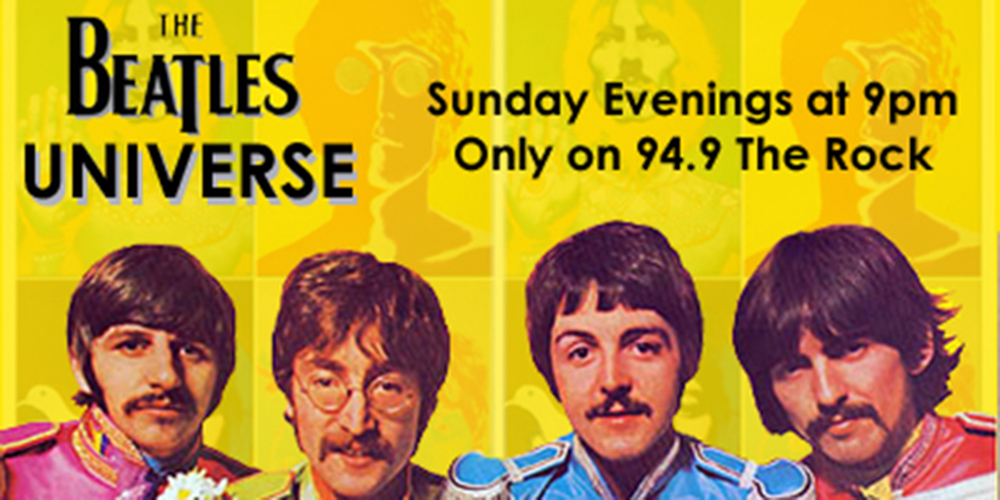
July 2007, and a roughly 39-year-old Aaron Badgley ventures back into radio after a twenty-year absence, hosting an original program concerning his favorite band, Beatles Universe. Was this indeed your first radio venture since CHUO-FM? How long had this program been maturing in your mind before it became a reality? How did you go about putting it together?
Yeah, it was. I really missed radio or at least the idea of radio. I have a profound love for the old days of radio (including, as you know, radio shows). So, it was a while to get back into it. But it worked out for a while.
Why did you choose the name Beatles Universe and what did it encompass? How vast was the program’s selection?
I picked the name because I played anything and everything associated with the Beatles, Apple stuff, Dark Horse stuff, things they played on, etc… Of course, I played Beatle hits, but I would play stuff like solo Pete Best. I used old interview clips, I played radio commercials of Beatles stuff, clips from movies, and music. I talked some as well and had guests but the focus was on the music. Some of the guests were an organizer of The Barrie Beatles Convention (I can’t remember his name), Mark Gane and Martha Johnson of Martha And The Muffins, May Pang (John’s girlfriend from 1973 – 1975), Rod Davies (from The Quarrymen), and members of Klaatu.
Did you have an audition program, or a first episode recorded when you approached CKGE 94.9 FM The Rock (formerly CKQT-FM 93.5 FM, where you once worked) to broadcast Beatles Universe? How did CKGE become involved, did you still have contacts at the station?
No, no contacts at the station. I actually sent them a ten-minute demo featuring highlights from the first three shows, which I had recorded already. I sent it to so many radio stations and came close with others but c’est la vie.
Your co-producer, engineer, and mixer for the show was Eric Walker. How did you two meet? Did he have any creative input on the show, was he ever on the air with you, or was he strictly a studio console guy for the show?
I met him through a friend at work, and as a producer, he had a lot to say about the programme. He has good ears and knows how to put things together. I picked the subjects and the songs, and he mixed it. If the song didn’t work, he was open about it and I changed it.


From 2007 to 2010, your show was broadcast on Sundays at 9 P.M., then in the spring of 2010, it was changed to Sundays at 9 A.M. Do you remember why?
It was the decision of the radio station. They moved me to the morning, not my choosing, but they did because it was noted that young people were listening with their parents. I got loads of emails from kids about some of the songs I played and how much they loved hearing the stuff. Again, I was flattered.
The Beatles Universe program was eventually put into repeat and syndication. For those who haven’t worked in radio, can you explain how program syndication comes about? Was it pitched to other stations via CKGE or through your own promotion? Was it syndicated during its original run or only after you stopped making new episodes in July 2011? Do you know how many stations picked it up and how far it reached (within Canada or outside Canada)?
Syndication is selling a show to radio stations. I did it all on my own. I tried selling it to other markets and had an early internet radio station in the US buy it, but they wanted only new shows, so when I went into repeats they cancelled it.
Although these shows were transcribed, there is, sadly, no online archive available anymore? Do you own the masters of these shows, or are they held by CKGE? Has there been interest in making these episodes available again?
I have a few, but I think my producer has them all. I would have to ask Eric. There was interest but they have gotten old, I would have to update a lot of them. I refer to certain music as “the brand new Ringo or Paul” and a lot has been released since the shows aired.
In July 2011, you stopped producing new episodes of Beatles Universe. How come? Had the program run its course or could it have gone on indefinitely? What did you do at this time, did you remain connected with the music business?
The show was no longer being funded, and I could not afford the studio anymore, so I decided to pull the plug. I don’t have a studio, and this was long before I could record and mix my own shows. At this point, I was working with the producer of the show trying to come up with other show ideas. Nothing relevant came out of those days. I was also experimenting with writing fiction, which was horrible.
In January 2016, you were one of a small handful of fans interviewed by Toronto Life about David Bowie, who had just died. The journalist, Chris Bateman, made no mention of your past accomplishments in radio or as a music critic, but instead introduced you as a “social worker from Etobicoke”. How did you end up getting singled out for this coverage? Did that have any influence on you getting back to writing music reviews later that year?
I just happened to be in line, near the front and the reporter just asked me why I was there and I answered. No other reason, that I can tell.
In December 2016, you started writing for Mississauga, Ontario-based The Spill Magazine. Do you remember when you first discovered that online magazine and what drew you to it? How did you become a contributor?
I had Googled Rational Youth (I think) and an article popped up from Spill. When I read it, there was an advertisement that they were looking for writers, so I sent some stuff in and they brought me on board.
Newton-le-Willows, Merseyside-based internet radio station, WA12Radio, announced on its website in June 2020 that you had joined the “BB Music Team”. What was the “BB Music Team” and how did you end up writing for them? Was this a short-lived partnership or are you still writing for them?
Garth Musk, who did the BB Show, every Tuesday, contacted me because of the writing I had been doing for Spill. He asked me to write stuff, uncredited, for the station. He then thought we should make it more official and I could write reviews, etc. Garth, bless his heart, has some issues and kept disappearing on me for months at a time. Nothing, radio silence, the show went off the air, everything. Then, boom, it was back on. I can’t work that way, so I kindly quit. My radio show, Backwards Traveler, was originally to be on that radio station, but he owned it and, as I said, he would disappear. So Marina Verdi, who is also a musician, started Perturb Radio and asked if I would move the show to her platform. Garth was not happy with this turn of events, so we don’t really talk anymore. He did express interest in the shows I am doing with Tony Stuart, but then he disappeared again.
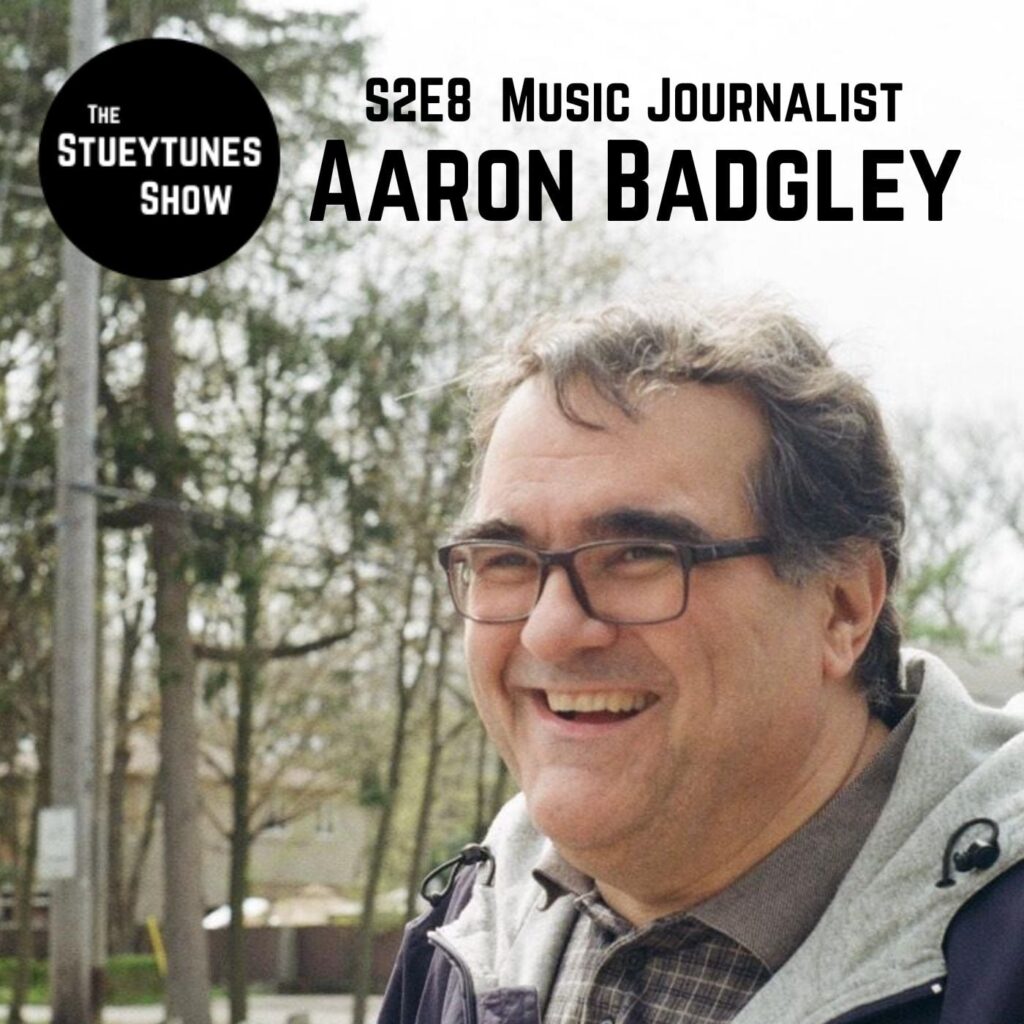
In July 2020, you were interviewed by Tony Stuart on the second season of his podcast program, The Stueytunes Show. Had you known Stuart before this interview? If not, how did he come to interview you?
I had never met him. I am friends with Bernard Frazer of Church Of Trees. He knew Tony through his son. Tony was his teacher. Tony had asked him to be on his podcast, and during that conversation, Bernard suggested he contact me. I did the show and we became fast friends. Tony approached me and asked if I would be interested in doing the podcast with him.
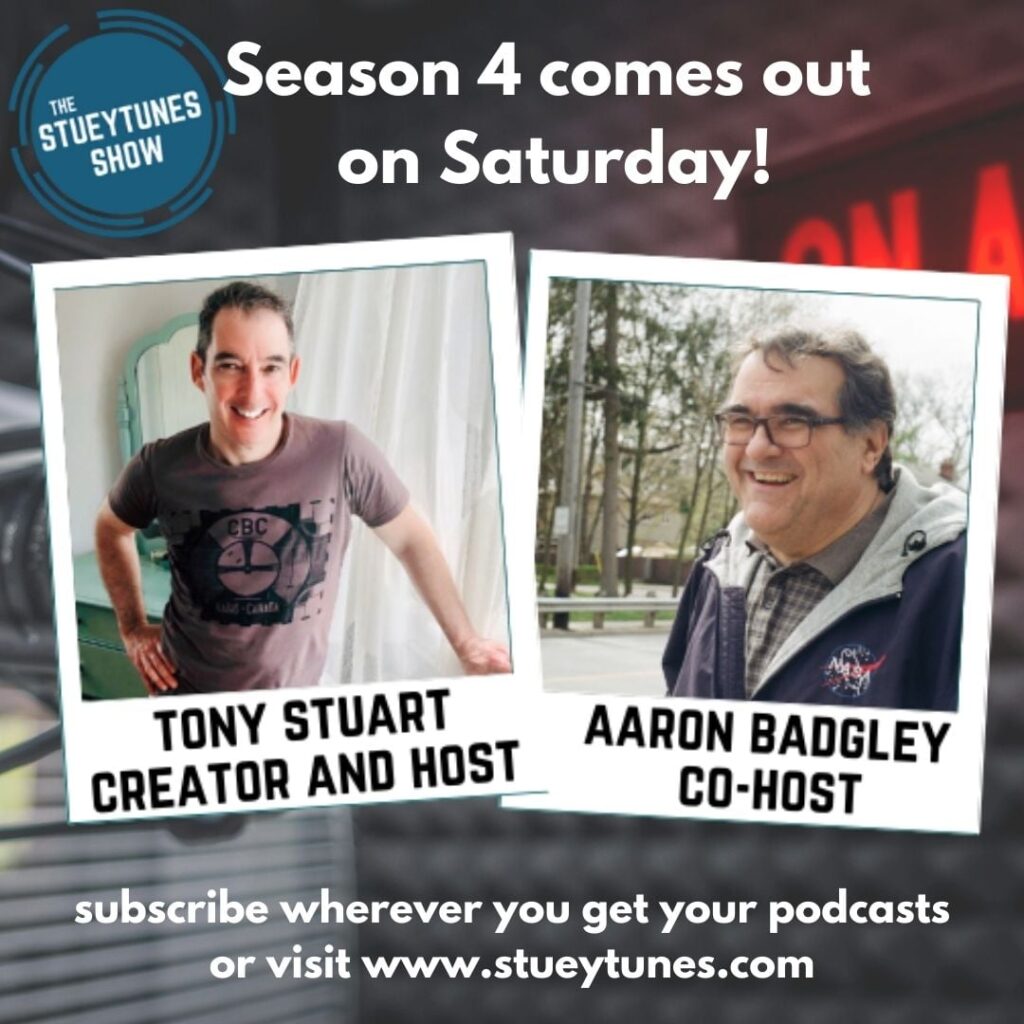
You two hit it off so well that you wound up doing a handful of podcasts and radio programs together, starting with you becoming a co-host for The Stueytunes Show‘s upcoming third season in September 2020. What was it like coming back to broadcasting after almost ten years? Did Stuart have to coax you into doing a regular program or were you eager to get back into it?
I am an old ham at heart. No, seriously, I love talking about music. So he did not have to twist my arm too much. The tricky part is that I really hate the sound of my voice, so I am still getting over that hurdle.
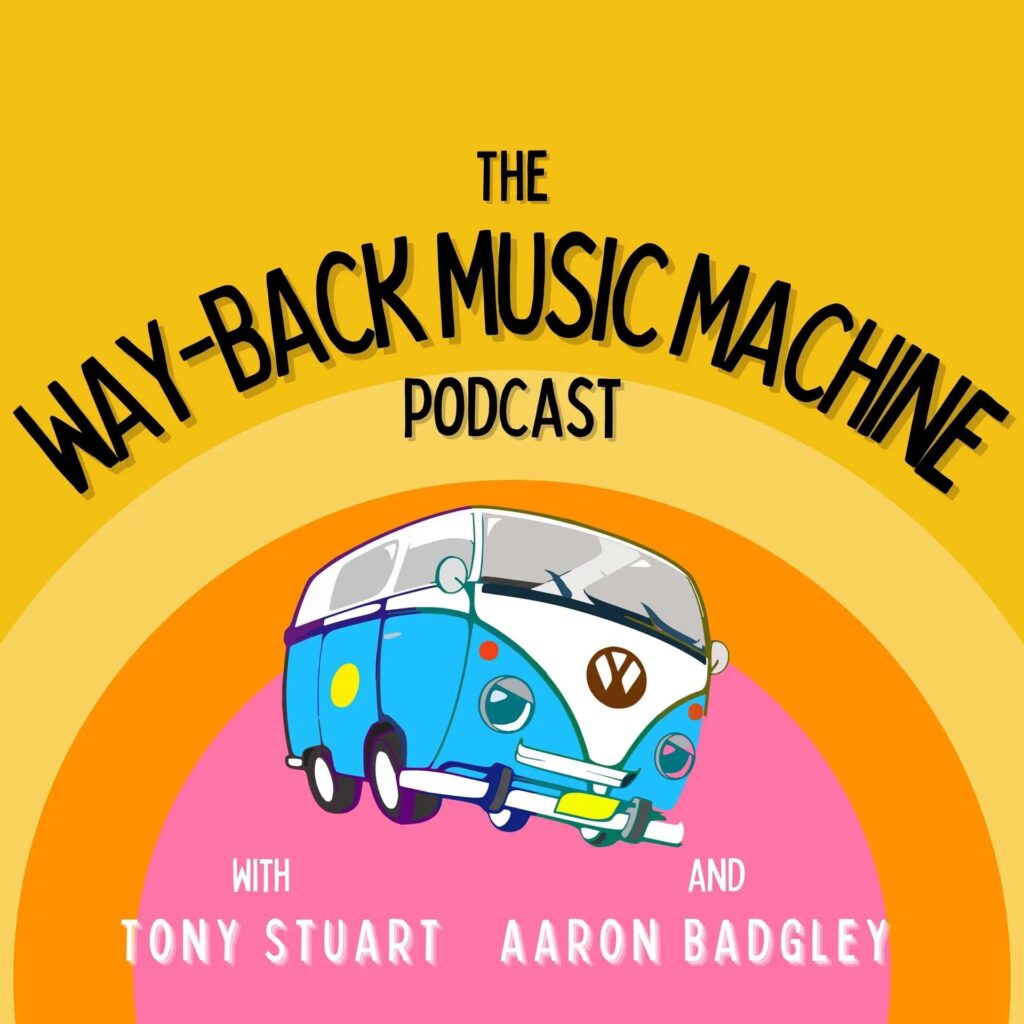
In March 2021, after four seasons of The Stueytunes Show, Stuart and you changed the name of the program to The Way-Back Music Machine Podcast. What inspired this name and why was it changed? What is a typical episode like?
The Way-Back Music Machine show was always intended to be a music historical show. We started off with general stories then we made the decision to do it week by week and day by day. This day in rock history, sort of. The intention was to talk about the lesser-known stories. The name change was because Tony wanted the show to reflect the fact that we were a working partnership and Stueytunes was his own show.
Both The Stueytunes Show and The Way-Back Music Machine Podcast listed a third team member, Ric Denis. What was Denis’ role on the shows? Is he still involved with The Way-Back Music Machine Radio Hour?
Ric is a friend of Tony’s. He has allowed us to use some old recordings he has made. Ric and Tony are in a band together, The Somerset Combo, who perform around the Ottawa area. He has never really been involved with the show, other than allowing us use of his music.
The Way-Back Music Machine Podcast was originally streamed via RedCircle Podcast, but in December 2022, the show was re-branded as The Way-Back Music Machine Radio Hour and moved to internet radio station Bombshell Radio. What prompted this change and what alterations came with it (aside from the name upgrade)? Syndication started in March 2023, to Rideau Lakes Radio, an internet station based in Westport, Ontario, and in December 2023 to CJNU-FM in Winnipeg, Manitoba. Who worked out those deals?
The show runs on a radio station in Winnipeg, CJNU 93.7, but Bombshell was the first place to pick us up. Spotify had set up a system where one could record their voices and talk during basically a Spotify playlist. Tony and I did that for ten shows (it was Before Our Time) and we decided to combine the two shows. We always thought Way-Back would be a better radio show than a pure podcast, so he made all the deals. I think he knew someone on Bombshell, and Winnipeg approached us after someone heard it. Tony knew John from Rideau Lakes and they wanted the show.
You joined Immersive Audio Album in May 2021, which covers a very narrow and special spectrum of releases. Can you talk about that and how you came to write for this publication? What kind of setup must one have to be able to review these releases?
Immersive Audio Album reviews surround sound releases. I contacted the publication to see if they were looking for writers. I had to ‘audition’ by sending a review and they brought me on board. I use my Blu-ray player which allows me to play things in 5.1 and surround sound.
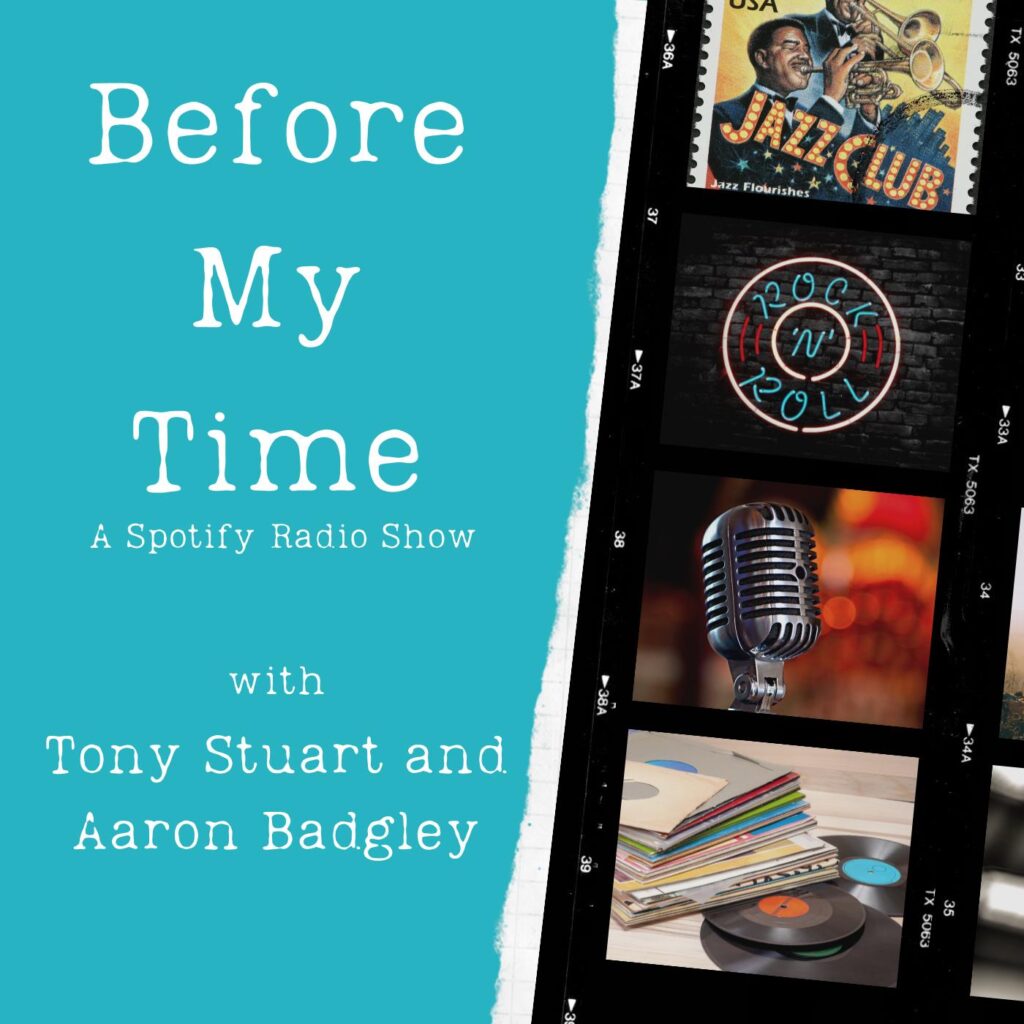
In June 2021, while Stuart and you were already doing The Way-Back Music Machine Podcast for RedCircle Podcast, you guys started a second podcast, Before My Time, which was exclusive to Spotify. What was the motivation behind starting a second show and what inspired its name? Why was this one not also hosted via RedCircle Podcast, like the other show, and why was it so short-lived (ending after fourteen episodes in October 2021)?
Spotify offered a feature that allowed people to upload talk and attach it to music that was available on Spotify, so both of us really wanted to do radio instead of podcasts, and this felt close to radio. It was a chance for us to DJ if you will. The name was because we were going to feature music that was popular before we were adults and would give us a chance to explore other music pre-rock and roll. It was short-lived because we had three people, which included our respective wives and his brother. So we thought we should do something that has the potential to reach more people.
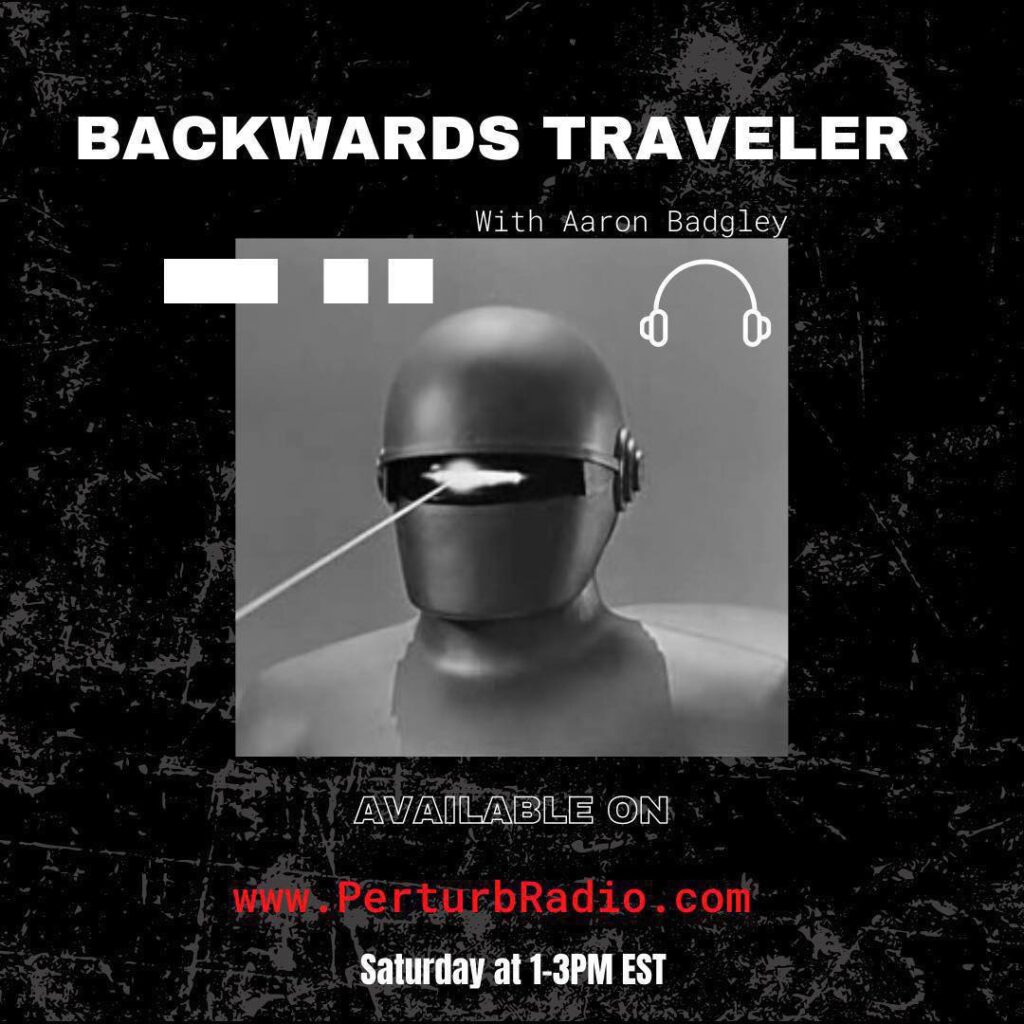
The same month that you launched Before My Time with Stuart (June 2021), you also premiered your new solo show, Backwards Traveler, for the online radio station PerturbRadio. What is the story behind this program’s name and what were you offering, by comparison to your other two shows with Stuart?
“Backwards Traveler” is a song by Paul McCartney off of the London Town album. I wanted to do a show that featured new music by older artists who could not get airtime on any other show. So bands like The Who, McCartney, Heaven 17, people like that. This show was much more alternative than the shows I did with Tony.
How did you link up with PerturbRadio?
I knew Marina Verdi from the station in the U.K. I was writing for, WA12Radio, and she started up Perturb Radio and asked if I would do a show.
Backwards Traveler ran for two years, coming to an end in May 2023. Why did it end?
Marina pulled the plug on Perturb Radio. No one else, at the time, was interested in the show, so I let it go… it was time.
You were still doing The Way-Back Music Machine Podcast with Stuart and had your own show, Backwards Traveler, when you brought to life another solo program, Here Today, in April 2022. What did you want to present with this program and how did you come up with the name?
Well, the original title was “Hear Today”. “Here Today” is another Paul McCartney song from his Tug Of War album. The idea of the show was to play new music from Canadians and other artists. Similar to Backwards Traveler, but with more of a Canadian slant. It is also only one hour, which limits what I can play.
Was it started with the intention to broadcast from CFRU-FM, or did you have to record an audition for the station? Were you happy to return to radio waves after being on internet radio stations and podcasts for the previous two years? Did you have to change the format of your show to meet CRTC rules and regulations (by comparison to Backwards Traveler)?
CFRU-FM approached me because one of their other DJs is a friend of Bernard Frazer (from the band Church Of Trees) and she knew my Backwards Traveler show. So Chris, the station programmer, emailed me and we talked and we came up with the show format. I was thrilled to get back to airwaves, I like being on real radio. I guess I am a ham.
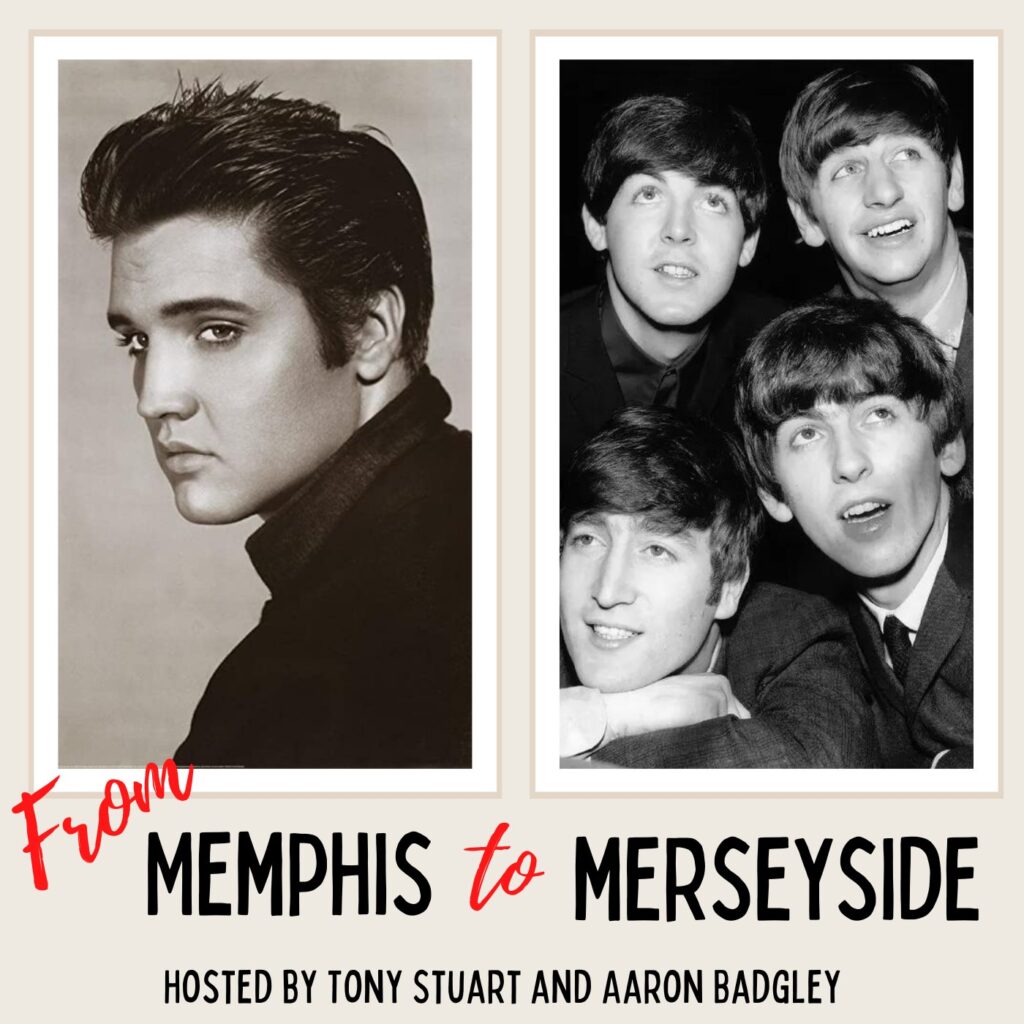
At this point in the timeline, October 2022, you have two solo radio programs (Backwards Traveler and Here Today), and although Stuart and you are also hosting The Way-Back Music Machine Podcast, you two decide to start a new radio program, From Memphis to Merseyside. How did you find the time to do all of these programs on top of writing for several publications? Can you describe how you two plan out, record, and mix your shows?
Well, I suffer from insomnia, so I write at night and early in the morning when I can’t sleep. The idea behind From Memphis to Merseyside was to look at history and music from 1954 (when Elvis recorded his debut single) to 1980 (which is when John Lennon was killed). We meet once a week to write and plan the show and we have always recorded together. We use Zencaster and Tony records and mixes it, I listen, and then it gets sent out. We have recorded in the same room whenever we visit the other person. It is always nice to record in the same room.
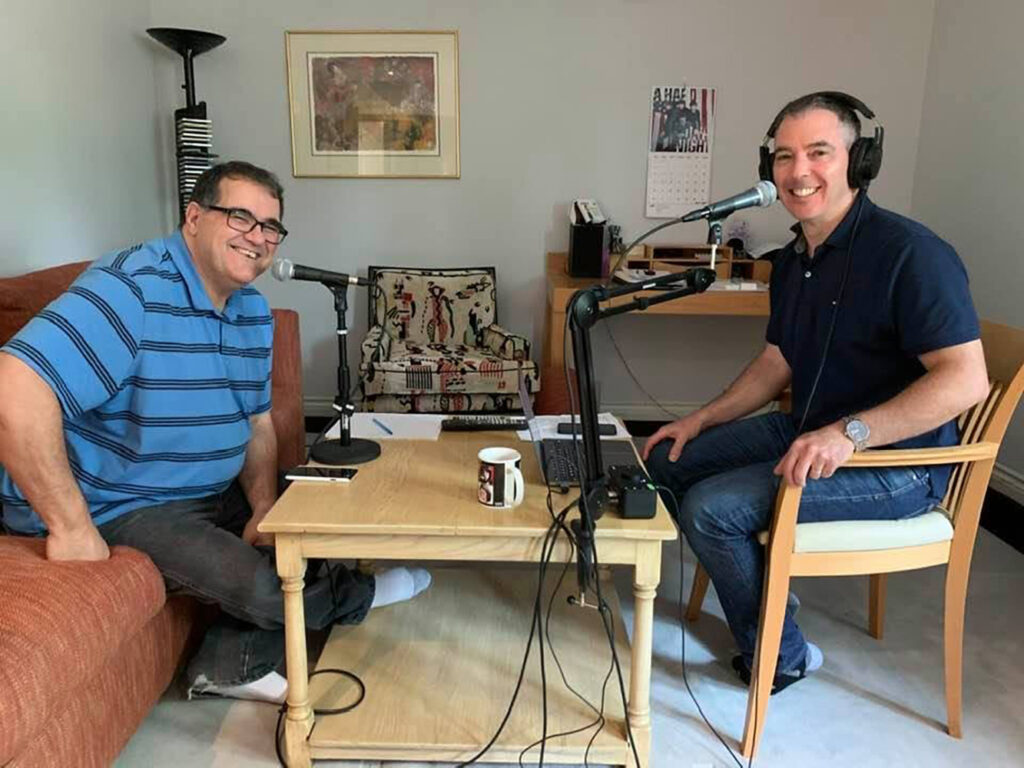
What inspired the name From Memphis to Merseyside? What is the difference between this show and The Way-Back Music Machine Podcast (which would be re-tooled into The Way-Back Music Machine Radio Hour only two months later), as both shows continue to air to this day, at times in following slots on select syndicated stations?
The name acknowledges Elvis (Memphis) and The Beatles (Merseyside, or Liverpool). It is different from The Way-Back Music Machine in that The Way-Back Music Machine (now named 8 Days This Week) is a ‘this day in rock music’ show.
This was your first show for Bombshell Radio – how did that come about?
Tony pitched it to Bombshell and they took it. I don’t really have anything to do with them.
Since January 2023, From Memphis to Merseyside has been syndicated to CHBB-FM in Norris Point, Newfoundland, and since July 2023 to Rideau Lakes Radio in Westport, Ontario. How did these deals come about? Would you say that this is your most successful program?
From Memphis To Merseyside has just been picked up in Winnipeg too! It is our most successful show. To get the deals, you have to hustle and approach radio stations. Loads don’t even bother writing back, but that is the way it goes.
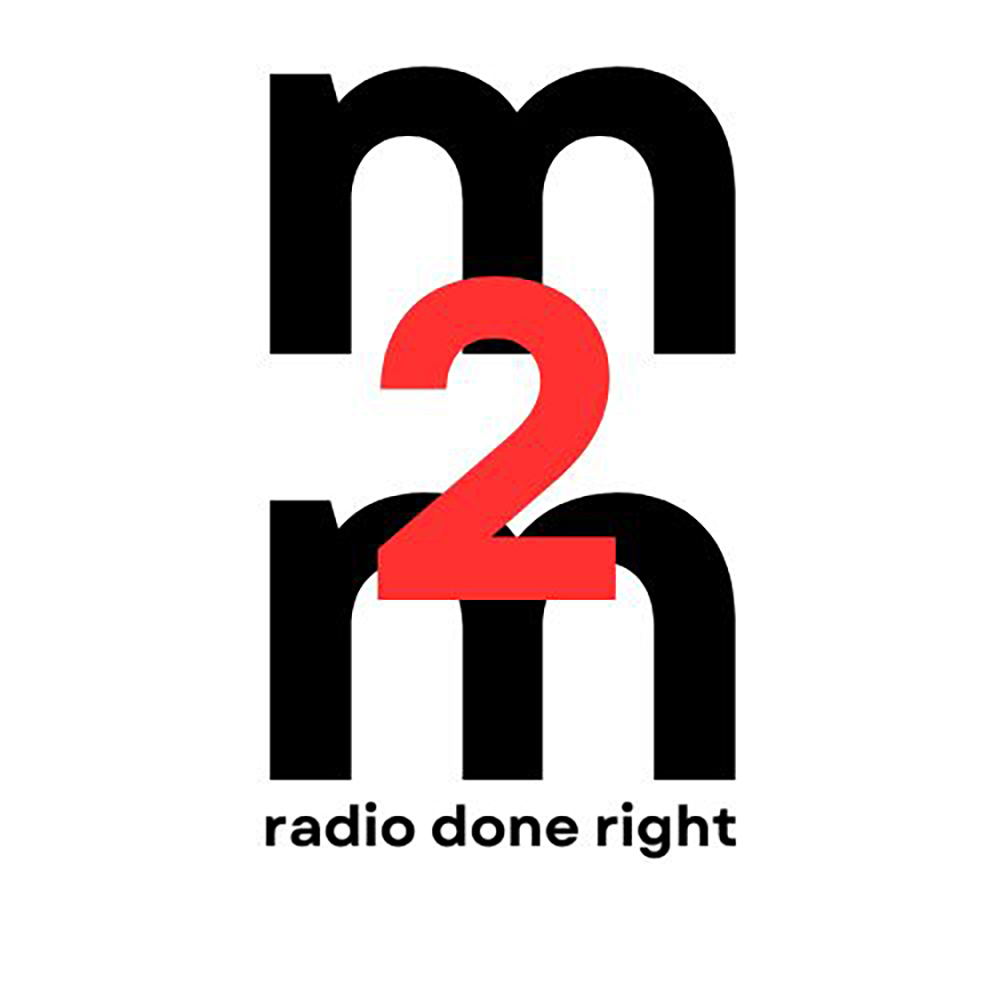
Stuart and you eventually formed M2M Productions in November 2023, which administers The Way-Back Music Machine Radio Hour (now 8 Days This Week) and From Memphis to Merseyside. Who’s idea was that and what does this company encompass?
It is Tony’s idea. We have done two radio shows for Church Of Trees and Tony does much more work for other stations, solo, than I do. M2M just means Memphis To Merseyside. Tony and I have a vision of being a production team one day.
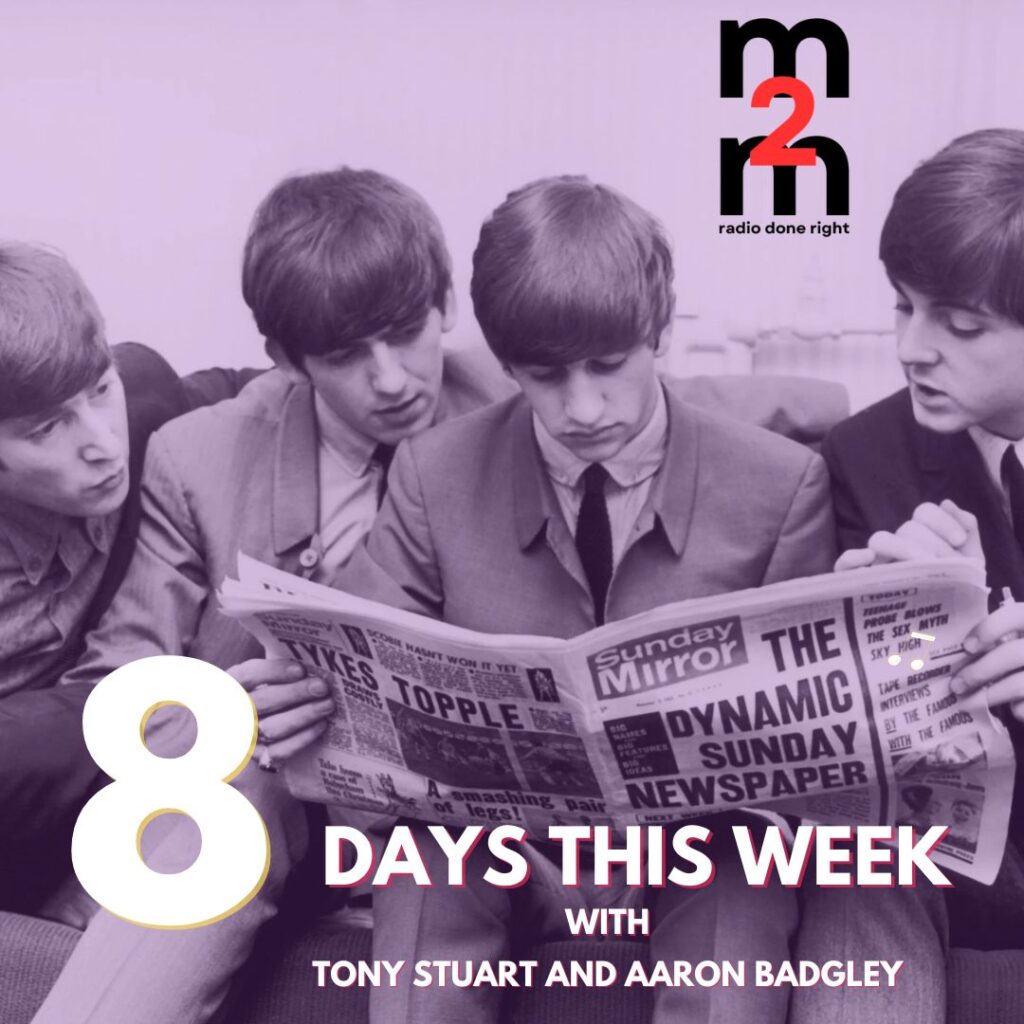
In April 2024, after 149 episodes, The Way-Back Music Machine Radio Hour was re-branded, yet again, to 8 Days This Week. How did this come about? Have any changes to the program been made? Is it more of a new program or just an alteration of The Way-Back Music Machine Radio Hour?
We added one component in which we show connections between the artists we talk about and so because we added a new part, Tony suggested we change the name. Also, we didn’t want to be tied to days of the week, so it is not that different from the older show. We cover eight stories that are from that week in rock history and you know I like to name shows after Beatle songs, or solo Beatles.
George Harrison formed his record label, Dark Horse Records, in 1974 when you were just ten years old. Do you recall hearing of the news at the time, or at what point did you become aware of his record label? Did you follow it growing up or only discover it later on?
When I was about nine, I became obsessed with The Beatles and that was all I talked about or listened to. I made a declaration to my mother one day, while we were shopping, that I was going to get every Beatle record. I had just gotten, as a gift, The Illustrated Record book of The Beatles which really was the first discography I had seen and I made a list of all the records. My mother, in an attempt to discourage me, said that collecting The Beatles meant I had to collect all their solo stuff, Apple stuff, and everything. About a month later I saw the Splinter album and I bought it, discovering the world of Dark Horse and I followed it since then. I used to go to A&M Records’ head office on Warden Avenue in Scarborough to see what had come out on Dark Horse and they would give me promo copies of everything. I still have them.
Do you consider yourself a Dark Horse Records collector then, in addition to being a researcher and biographer? Do you have a large collection of the record company’s releases and seek out rare items (many of which you make a point to mention in your book)?
I do consider myself a collector and have a pretty extensive collection. I am missing maybe five releases and I am always on the hunt. Finding non-George Harrison Dark Horse cassettes is really hard, I have a few but not all.
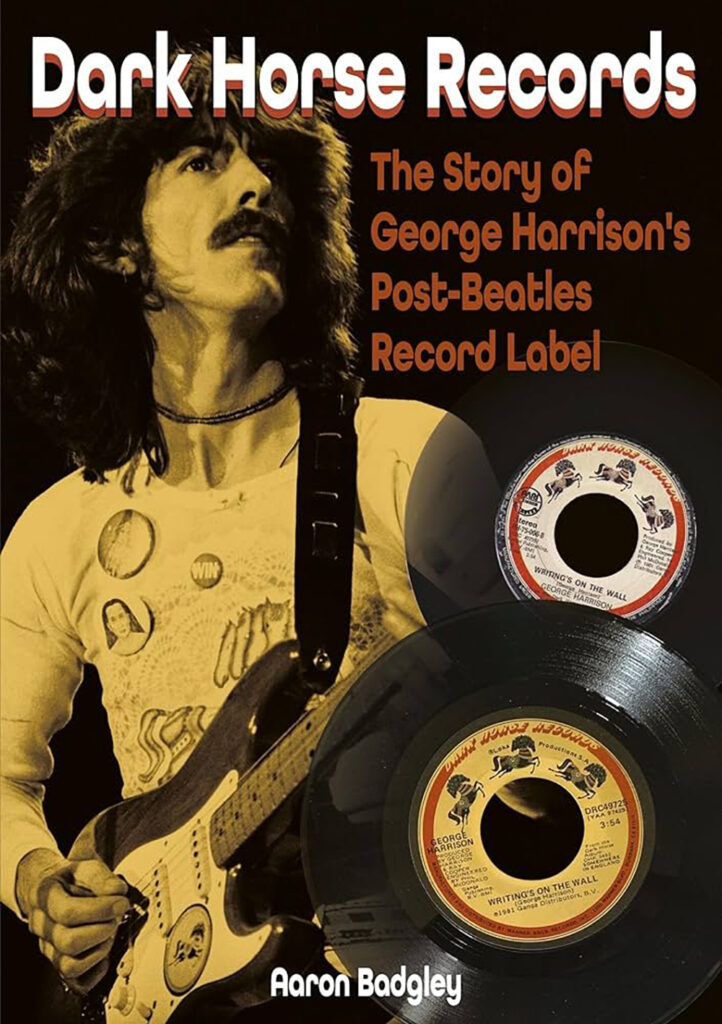
When did you start working on this book? What was the defining moment when you said “Okay, someone has to document this properly.”? How long did you end up spending on the project?
I do remember the moment. I interviewed another Beatles author, Kenneth Womack, and after the interview, we were talking. He said I should write a book because I was pretty knowledgeable about The Beatles and he liked my writing (he had read many of my Spill articles). So, while we were talking, I said, it is a shame that no one has written a book about Dark Horse Records, and he said, why not you? I thought about it and decided to try. I started the book in 2018.
How did you come upon Sonicbond, the publishing company that ultimately published your book? I understand that a couple of other publishers originally offered to release it; what happened with them and are you at liberty to mention those companies now?
One publisher wanted me to focus on Harrison’s personal life, his substance abuse problem, and his divorce. That wasn’t what I wanted to do, so they dropped me. I had a couple of books published by Sonicbond, so I wrote to them. He (Stephen Lambe) wanted to see what I had done up to that point, and he signed me.
Were you still writing and editing the book while dealing with publishers or was your book completed by a certain date? Full Moon Media did the typesetting and design and Dominic Sanderson did the editing; were they brought in by Sonicbond Publishing? Did you have any input on their work?
The date kept changing for a number of reasons, but mostly we wanted to make sure we put out the best book possible at the time. Once we set the two release dates (December 8, 2023, in the UK/Europe and January 24, 2024, in North America), I had to work to a deadline. It was exciting, frustrating, and fun. Full Moon Media was brought in by Sonicbond. I never even talked to them.
Were any segments edited from the book that you wish had been kept?
I had written reviews for every album and single in the book, which were taken out due to length.
Was it intentional to use “All Those Years Ago”‘s 7-inch vinyl single B-side, “Writing’s on the Wall”, on the book cover? Was there a play on words, or is it just a song you really like?
It was really intentional on the publisher’s part. I really had nothing to do with it. I did ask for the back of the book to be changed, as it had a photo of All Things Must Pass, which was released on Apple, so I requested the Ravi Shankar album. I also suggested a picture of George during his ‘Dark Horse’ Tour.
In the book, you mention something called The Dark Horse Radio Show. Was there such a thing or was it just a promotional record that the company sent to radio stations?
That is a very rare album, pressed on Dark Horse and sent out to U.S. radio stations. It is hard to find, and quite interesting. I found a copy many years ago.
Why do you think the Shanghai Surprise soundtrack was never released? “Breath Away From Heaven” was released as the b-side to a single, but it was the Cloud Nine version, not the film score version.
I am convinced it was never released due to the remarkably poor press it received and it was a relative failure. But, as I point out in the book, none of Harrison’s Handmade Films (his company) had soundtracks released on Dark Horse. It was a huge, missed opportunity.
Was there a piece of information, a legal document, a release date, or a rumored existence of material that you had really hoped to find for the book but had to do without?
There were some legal documents about the lawsuit with A&M I could not source and I wish I had.
Is this a one-time publication or do you foresee working on a revised/second edition?
I think in about five years there will be a second edition. I am working on a Dark Horse Records webpage that will be a resource for collectors. I have gotten the book to his family but have not had any response. Perhaps they are slow readers?
In February 2024, you were invited as a guest at The Fest For Beatle Fans. How did that happen? Was it your first time attending the convention? Can you talk about your book stand and how it was autographing your book for all these fans?
They had contacted me about selling autographed copies through their website, which I was more than happy to do. Once they had the book, they asked if I wanted to attend. I will be attending the one in August in Chicago as well. Believe it or not, it was the first time I ever attended and I had a blast. I think I spent more money than I made, but it was fun to spend 72 hours of Beatles and Beatles talk.
I understand you have three book projects already in the works. The first is on the history of Christmas music, how far along is that one, and what motivated you to embark on this endeavor?
I have just started the research on that one. I love Christmas music and the history of its popularity is quite interesting. It is also a subject that, to the best of my knowledge, no one has written about, so why not me?
You’re also working on a book about Ringo Starr? What can you share about that one? How long has this one been in motion and what will it cover?
The Ringo Book starts on January 1, 1970, and ends on December 31, 1979. It is about his music, career, acting, his record label (Ring ‘O Records), and his life during that decade. It is interesting, because for the first half of the 1970s he was huge, I mean top of the charts huge, but by 1976 things collapsed and he finished the decade off on the lower regions of the charts and not being terribly productive. It is also interesting the amount of work he did for other artists and his numerous films.
And finally, you were approached to write the official biography of Klaatu? How did that come about?
Well, I am a long-time fan, and I know two of the three members really well. You could say we are friends. No one has written a book about the group, and my publisher and I thought now was as good a time as any. I want them to tell their story with me doing a lot of research to verify stories and, in some cases, correct them. It is a labour of love.
Alexander Julien
Headline photo: Linda Badgley
Aaron Badgley Official Website

